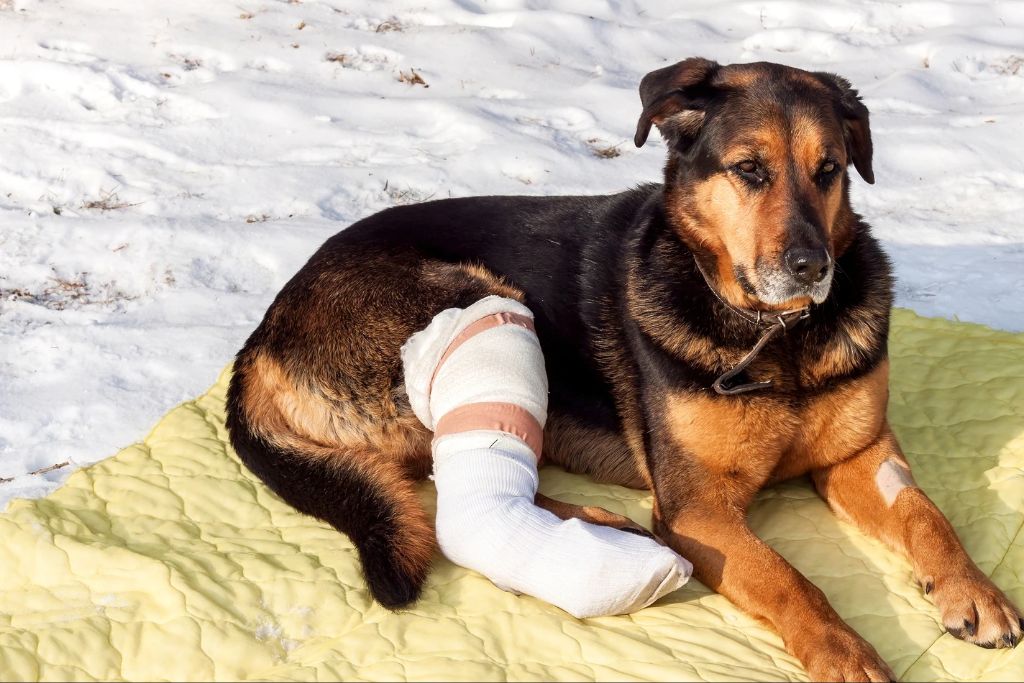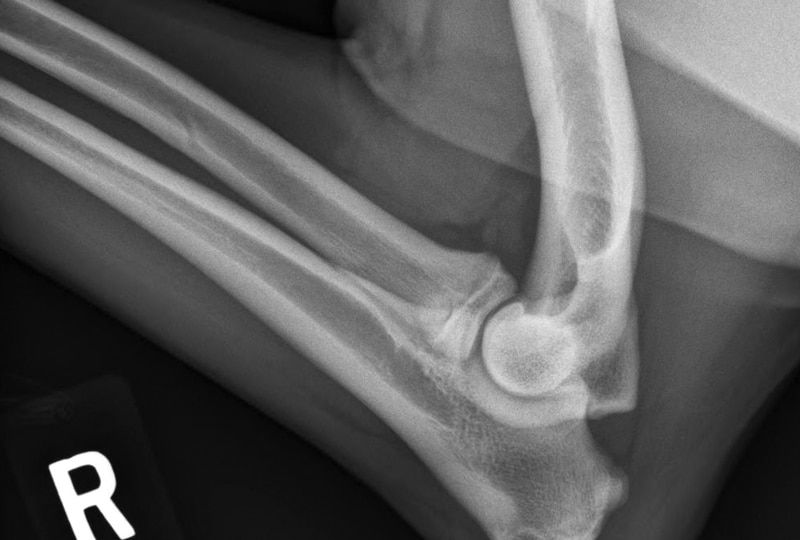Introduction
Sudden onset arthritis in dogs, also known as acute arthritis, refers to the rapid development of arthritis symptoms that seem to appear ‘overnight’. It is characterized by severe inflammation of the dog’s joints that leads to lameness, stiffness, swelling, and pain. Sudden onset arthritis differs from regular arthritis in that the symptoms manifest very quickly rather than gradually over time. While arthritis is common in older dogs, sudden onset arthritis can affect dogs of any age.
The condition can be very concerning and painful for dogs. Symptoms often appear rapidly and worsen quickly, significantly impacting the dog’s mobility and quality of life. Sudden inability to walk or move normally is distressing for both the dog and its owner. That’s why it’s critical to diagnose and treat sudden arthritis as soon as possible. The prognosis depends on the underlying cause and how promptly treatment is initiated.
Some of the most common causes of sudden arthritis include injuries, infections, and immune-mediated diseases. Diagnosis involves evaluating the dog’s symptoms, medical history, and using diagnostic tests like x-rays, bloodwork, and joint fluid analysis. Treatment focuses on addressing the underlying cause along with symptom relief. With prompt veterinary care, many dogs can make a full recovery and regain normal joint function.
Causes of Sudden Arthritis in Dogs
There are several potential causes for sudden arthritis symptoms in dogs:
Injuries

Sudden onset of arthritis symptoms may be caused by an injury to a joint or ligament, such as an anterior cruciate ligament (ACL) tear. Dogs that injure a joint or ligament can develop inflammation and arthritis relatively quickly in the affected joint. Knee injuries in particular often lead to sudden arthritis in dogs. According to this source, an injured ACL may cause a dog to exhibit sudden arthritis-like symptoms in the affected leg.
Infections
Bacterial or fungal infections in a joint can also lead to sudden arthritis. The infection causes inflammation in the joint which leads to damage and arthritis. Infection types that may cause this include Lyme disease, Rocky Mountain Spotted Fever, or a localized joint infection. Joint infections require urgent veterinary care including antibiotics and draining fluid from the infected joint.
Immune-Mediated Arthritis
Some forms of inflammatory or immune-mediated arthritis like rheumatoid arthritis can also have sudden onset of symptoms. With these conditions, the dog’s immune system attacks its own joints leading to inflammation and damage. According to veterinarians, immune-mediated polyarthritis tends to affect younger dogs while osteoarthritis from wear-and-tear is more common in older dogs. However, both can lead to sudden arthritis symptoms.
Injuries
One of the most common causes of sudden arthritis in dogs is injuries, especially anterior cruciate ligament (ACL) tears. ACL tears are a very prevalent injury in dogs, accounting for around 20% of all orthopedic injuries according to one estimate (https://topdoghealth.com/library/orthopedic-condition/articles/acl-tears/). ACL tears can occur through sudden trauma like falling or being hit by a car, but most happen gradually over time as the ligament degenerates.
When the ACL tears, it causes instability in the knee joint. This instability leads to abnormal wear and tear, inflammation, and damage to the cartilage and other structures in the joint. Over time, this process accelerates into osteoarthritis. Studies show that 90% of dogs with untreated ACL tears will develop debilitating arthritis within 1 year (https://www.ncbi.nlm.nih.gov/pmc/articles/PMC7542452/). So while the initial ACL tear may not be painful itself, it often leads to rapid onset of arthritis symptoms like lameness, stiffness, and joint pain.
Infections

One common type of infection that can lead to sudden arthritis in dogs is septic arthritis, which is a bacterial infection within the joint space. Septic arthritis usually occurs when bacteria enters the joint either through a penetrating wound, systemic spread from an infection elsewhere in the body, or through the bloodstream from an infected heart valve or immune-mediated disease (Source).
Joint infections like septic arthritis can rapidly damage the cartilage and bone, leading to severe arthritis symptoms seemingly overnight. The most commonly affected joints are the stifles, hocks, elbows, and hips. Some of the most common bacterial organisms involved in septic arthritis include Staphylococcus, Streptococcus, E. coli, and Mycoplasma (Source).
Other types of infections like Lyme disease can also cause sudden onset of arthritis in dogs. The bacteria Borrelia burgdorferi is transmitted through tick bites and invades joints, leading to inflammation and arthritis, especially in the carpal and tarsal joints (Source).
Immune-mediated
Immune-mediated polyarthritis is an autoimmune disease where the dog’s immune system attacks its own joint tissues, causing inflammation and erosion of the joints. Certain breeds like German Shepherds, Labrador Retrievers, and Golden Retrievers are genetically predisposed to developing immune-mediated polyarthritis.
The immune system mistakeately identifies normal joint proteins as foreign invaders and makes antibodies that target and damage the joint tissues. This leads to an aggressive inflammatory response in multiple joints that can rapidly cause erosion of cartilage and bone. Immune-mediated polyarthritis often affects the carpal and tarsal joints initially before spreading to other joints.
While the exact cause is unknown, this form of arthritis in dogs is likely triggered by a combination of genetic and environmental factors. Possible triggers include other infections that activate the immune system, as well as trauma or stress to the joints. However, the underlying autoimmune reaction leads to ongoing inflammation even after the initial trigger is gone.
Sources:
https://www.merckvetmanual.com/musculoskeletal-system/arthropathies-and-related-disorders-in-small-animals/immune-mediated-arthritis-in-dogs-and-cats
https://www.dvm360.com/view/recognizing-and-treating-immune-mediated-polyarthritis-dogs
Diagnosis

Diagnosing the cause of sudden arthritis in dogs involves several tests to identify the underlying condition. The vet will start with a complete physical exam, looking for signs of injury, infection, or inflammation. They may manipulate the joints to check for pain, swelling, and range of motion.
One of the most common diagnostic tests is X-rays (radiographs) of the joints, which can detect bone changes like arthritis. The vet will likely take images of the joints from multiple angles to get a complete picture. Radiographs can also spot fractures, luxations, and bone cancer.
If an infection is suspected, the vet may perform a joint tap to extract synovial fluid for analysis. Testing the synovial fluid can identify inflammatory cells and infectious organisms. Blood tests are also important to check for signs of systemic illness or immune disorders.
Identifying the underlying cause of sudden arthritis is crucial for proper treatment. While some arthritis is age-related, an acute onset points to an inciting cause like trauma, a tick-borne disease, or immune-mediated arthritis. Diagnostic testing helps determine if the arthritis is localized or a systemic condition. With an accurate diagnosis, the vet can provide medications, therapy, or surgery targeted to the specific problem.
Treatment
Treating sudden onset arthritis in dogs requires prompt veterinary attention to alleviate pain, reduce inflammation, and prevent further joint damage. Common treatment options include:
Nonsteroidal anti-inflammatory drugs (NSAIDs) like carprofen or meloxicam to relieve pain and inflammation. These should be used cautiously under veterinary supervision due to potential side effects.1
Antibiotics if an infection is causing the arthritis. Bacterial infections like Lyme disease can trigger immune-mediated arthritis.2
Surgery such as joint replacement or arthroscopic surgery may be necessary for severe joint injuries or damage. These invasive procedures require extensive aftercare and rehabilitation.
In addition to medication and surgery, physical therapy, weight management, joint supplements, and assistive devices like harnesses can also help dogs with sudden onset arthritis.
The key is to get veterinary assessment and begin appropriate treatment right away to maximize outcomes. Allowing the inflammation and pain to persist can lead to chronic irreversible arthritis.
Prognosis
The prognosis for a dog with sudden onset arthritis depends greatly on the underlying cause. Injuries or infections that lead to arthritis may be treated more easily and have a better prognosis than immune-mediated arthritis. However, arthritis from any cause has a tendency to worsen over time.
For dogs with injuries, the prognosis is generally good if the injury is treated promptly with rest, anti-inflammatories, and physical therapy. Full recovery is possible, especially when caught early. However, arthritis may develop later due to permanent joint damage. Close monitoring and appropriate treatment can slow progression.
Infectious causes like Lyme disease can be cured with antibiotics if treated early. However, permanent joint damage is still possible. Dogs cured of the infection will need ongoing management to control arthritis symptoms and prevent further deterioration.
The most challenging prognosis is for immune-mediated polyarthritis, which causes rapid destruction of joint tissue. Intense treatment is required to stop the immune attack. While remission is possible, joint damage is typically irreversible. Managing pain and slowing the progression of arthritis will be lifelong endeavors.
Overall, the prognosis for sudden onset arthritis depends on the cause and how quickly treatment begins. While arthritis itself is incurable and progressive, an early diagnosis and prompt treatment provide the best chances of maximizing recovery and maintaining quality of life.
Prevention

There are several ways to help prevent the onset and progression of arthritis in dogs. Getting dogs screened through routine veterinary exams can help catch early signs of joint issues or immunities that could lead to arthritis. Staying on top of dental care is also important, as tooth and gum infections have been linked with immune-mediated polyarthritis. Keeping dogs at a healthy weight lowers the stress on joints and reduces the chances of injuries that could trigger arthritis. Feeding dogs joint supplements with glucosamine and chondroitin may also help delay the onset of arthritis. However, arthritis cannot be completely prevented in dogs. Even with the best preventative care, genetic predispositions and the cumulative effects of aging makes arthritis likely at some point later in a dog’s life.
Conclusion
In summary, there are several potential causes for sudden onset arthritis in dogs including injuries, infections, and immune-mediated diseases. It’s important to get an accurate diagnosis from your veterinarian, as the underlying cause will determine the appropriate treatment plan. Sudden arthritis can be very painful for dogs, so getting prompt veterinary attention is crucial. With proper treatment and management, many dogs with sudden arthritis can lead happy and active lives. Identifying the cause early and beginning treatment quickly leads to the best outcome. Being aware of the risk factors and staying vigilant about any changes in your dog’s mobility can help catch arthritis in its early stages when it is most treatable.